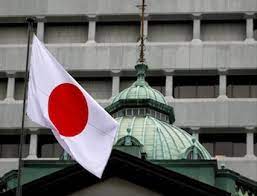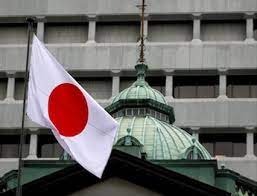
Unexpectedly entering a recession at the end of the previous year, Japan lost its position as the third-largest economy in the world to Germany, casting doubt on the timing of the central bank's decision to cease its ultra-loose monetary policy that had been in place for ten years.
A difficult road to economic recovery and policymaking is indicated by weak demand in China, slow consumption, and production stoppages at a Toyota Motor Corp. business, according to some analysts, who are predicting further decline in the current quarter.
"What's particularly striking is the sluggishness in consumption and capital expenditure that are key pillars of domestic demand," said Yoshiki Shinke, senior executive economist at Dai-ichi Life Research Institute.
"The economy will continue to lack momentum for the time being with no key drivers of growth."
Government figures released on Thursday revealed that Japan's gross domestic product (GDP) declined by an annualised 0.4% in the October–December quarter following a 3.3% decline in the previous quarter, defying market expectations for a 1.4% growth.
A technical recession is often defined as two consecutive quarters of contraction.
The Bank of Japan's prediction that growing wages will support consumption and sustainably contain inflation around its 2% target may be called into question in light of the poor data, even if many experts still expect the bank to phase off its enormous monetary stimulus this year.
"Two consecutive declines in GDP and three consecutive declines in domestic demand are bad news, even if revisions may change the final numbers at the margin," said Stephan Angrick, senior economist at Moody's Analytics.
"This makes it harder for the central bank to justify a rate hike, let alone a series of hikes."
Yoshitaka Shindo, the minister of economy, emphasised that strong wage growth is necessary to support consumption, which he said was "lacking momentum" as a result of rising costs.
"Our understanding is that the BOJ looks comprehensively at various data, including consumption, and risks to the economy in guiding monetary policy," he told a news conference after the data's release, when asked about the impact on BOJ policy.
Following the data, the yen held stable and was last seen at 150.22 per dollar, close to a three-month low that was reached earlier this week.
Following the data, yields on Japanese government bonds decreased as some traders withdrew their bets on an early change in BOJ policy. At 0.715%, the benchmark 10-year yield fell 4 basis points. The Nikkei market index surged to 34-year highs, supporting the BOJ's recent guarantees that borrowing costs will remain low even when negative rates are eliminated.
"Weak domestic demand makes it hard for the BOJ to pivot towards monetary tightening," said Naomi Muguruma, chief bond strategist at Mitsubishi UFJ Morgan Stanley Securities. "The hurdle for ending negative rates in March has risen."
More than half of economic activity is accounted for by private consumption, which decreased by 0.2% compared to market expectations of a 0.1% increase as mild weather and rising living expenses deterred people from dining out and purchasing winter clothing.
Another important driver of private sector growth, capital spending, decreased by 0.1% versus estimates of a 0.3% increase.
For the third consecutive quarter, both capital spending and consumption decreased.
According to a quarterly study, large enterprises anticipate raising capital expenditure by a substantial 13.5% in the year that ends in March. However, experts note that a lack of labour and growing raw material costs have caused a delay in real investment.
Considered a leading indicator of capital spending, the most recent data on machinery orders showed a contraction in November, casting doubt on the BOJ's belief that strong investment will support the economy.
Exports increased by 2.6% over the previous quarter, meaning that external demand—that is, exports less imports—contributed 0.2 percentage points to GDP. Ending negative rates by April has bene the target of the BOJ for which it has been putting in the groundwork. It also plans to reorganize the other elements of the ultra-loose monetary framework that is it following. However, it is likely that the central bank would take a slower approach for any subsequent policy tightening as there is lingering risks, according to reports quoting sources.
An exit from accommodative policy would come at a time the U.S. The Federal Reserve is expected to lower borrowing costs this year after taking a break from its aggressive interest rate hikes.
As the outlook for China and the United States improved in January, the International Monetary Fund revised up its prediction for global growth but issued a warning about potential risks, such as geopolitical tensions in the Middle East.
Many market participants anticipate that the BOJ will terminate negative rates in either March or April, even though authorities have not provided any indication when they could do so. April was the experts' preferred month to end the negative rate policy, according to a January Reuters survey.
According to several observers, Japan's strong business investment intentions and competitive labour market are preserving the possibility of an early withdrawal from its extremely lax policies.
"The (BOJ) has been arguing that private consumption has 'continued to increase moderately' and we suspect that it will continue to strike an optimistic tone at its upcoming meeting in March," said Marcel Thieliant, head of Asia-Pacific at Capital Economics, according to his prediction, the bank's negative interest rate policy will expire in April.
(Source:www.investing.com)
A difficult road to economic recovery and policymaking is indicated by weak demand in China, slow consumption, and production stoppages at a Toyota Motor Corp. business, according to some analysts, who are predicting further decline in the current quarter.
"What's particularly striking is the sluggishness in consumption and capital expenditure that are key pillars of domestic demand," said Yoshiki Shinke, senior executive economist at Dai-ichi Life Research Institute.
"The economy will continue to lack momentum for the time being with no key drivers of growth."
Government figures released on Thursday revealed that Japan's gross domestic product (GDP) declined by an annualised 0.4% in the October–December quarter following a 3.3% decline in the previous quarter, defying market expectations for a 1.4% growth.
A technical recession is often defined as two consecutive quarters of contraction.
The Bank of Japan's prediction that growing wages will support consumption and sustainably contain inflation around its 2% target may be called into question in light of the poor data, even if many experts still expect the bank to phase off its enormous monetary stimulus this year.
"Two consecutive declines in GDP and three consecutive declines in domestic demand are bad news, even if revisions may change the final numbers at the margin," said Stephan Angrick, senior economist at Moody's Analytics.
"This makes it harder for the central bank to justify a rate hike, let alone a series of hikes."
Yoshitaka Shindo, the minister of economy, emphasised that strong wage growth is necessary to support consumption, which he said was "lacking momentum" as a result of rising costs.
"Our understanding is that the BOJ looks comprehensively at various data, including consumption, and risks to the economy in guiding monetary policy," he told a news conference after the data's release, when asked about the impact on BOJ policy.
Following the data, the yen held stable and was last seen at 150.22 per dollar, close to a three-month low that was reached earlier this week.
Following the data, yields on Japanese government bonds decreased as some traders withdrew their bets on an early change in BOJ policy. At 0.715%, the benchmark 10-year yield fell 4 basis points. The Nikkei market index surged to 34-year highs, supporting the BOJ's recent guarantees that borrowing costs will remain low even when negative rates are eliminated.
"Weak domestic demand makes it hard for the BOJ to pivot towards monetary tightening," said Naomi Muguruma, chief bond strategist at Mitsubishi UFJ Morgan Stanley Securities. "The hurdle for ending negative rates in March has risen."
More than half of economic activity is accounted for by private consumption, which decreased by 0.2% compared to market expectations of a 0.1% increase as mild weather and rising living expenses deterred people from dining out and purchasing winter clothing.
Another important driver of private sector growth, capital spending, decreased by 0.1% versus estimates of a 0.3% increase.
For the third consecutive quarter, both capital spending and consumption decreased.
According to a quarterly study, large enterprises anticipate raising capital expenditure by a substantial 13.5% in the year that ends in March. However, experts note that a lack of labour and growing raw material costs have caused a delay in real investment.
Considered a leading indicator of capital spending, the most recent data on machinery orders showed a contraction in November, casting doubt on the BOJ's belief that strong investment will support the economy.
Exports increased by 2.6% over the previous quarter, meaning that external demand—that is, exports less imports—contributed 0.2 percentage points to GDP. Ending negative rates by April has bene the target of the BOJ for which it has been putting in the groundwork. It also plans to reorganize the other elements of the ultra-loose monetary framework that is it following. However, it is likely that the central bank would take a slower approach for any subsequent policy tightening as there is lingering risks, according to reports quoting sources.
An exit from accommodative policy would come at a time the U.S. The Federal Reserve is expected to lower borrowing costs this year after taking a break from its aggressive interest rate hikes.
As the outlook for China and the United States improved in January, the International Monetary Fund revised up its prediction for global growth but issued a warning about potential risks, such as geopolitical tensions in the Middle East.
Many market participants anticipate that the BOJ will terminate negative rates in either March or April, even though authorities have not provided any indication when they could do so. April was the experts' preferred month to end the negative rate policy, according to a January Reuters survey.
According to several observers, Japan's strong business investment intentions and competitive labour market are preserving the possibility of an early withdrawal from its extremely lax policies.
"The (BOJ) has been arguing that private consumption has 'continued to increase moderately' and we suspect that it will continue to strike an optimistic tone at its upcoming meeting in March," said Marcel Thieliant, head of Asia-Pacific at Capital Economics, according to his prediction, the bank's negative interest rate policy will expire in April.
(Source:www.investing.com)





